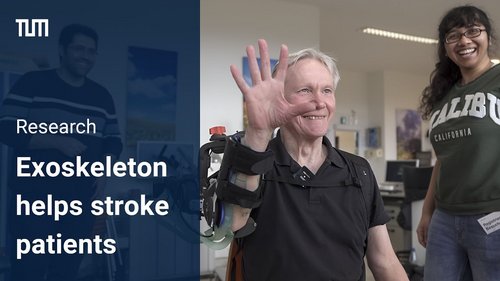- Framework for Learning a Hand Intent Recognition Model from sEMG for FES-Based control. 2024 10th IEEE RAS/EMBS International Conference for Biomedical Robotics and Biomechatronics (BioRob), IEEE, 2024, 1320-1327 mehr… BibTeX Volltext ( DOI )
- Data-Driven Momentum Observers With Physically Consistent Gaussian Processes. IEEE Transactions on Robotics 40, 2024, 1938-1951 mehr… BibTeX Volltext ( DOI ) Volltext (mediaTUM)
- Toward Dexterous Hand Functional Movement: Wearable Hybrid Soft Exoglove-FES Study. 2024 10th IEEE RAS/EMBS International Conference for Biomedical Robotics and Biomechatronics (BioRob), 2024 mehr… BibTeX Volltext ( DOI ) Volltext (mediaTUM)
- Online detection of compensatory strategies in human movement with supervised classification: a pilot study. Frontiers in Neurorobotics 17, 2023 mehr… BibTeX Volltext ( DOI )
- Assessing Human-Human Kinematics for the Implementation of Robot-Assisted Physical Therapy in Humanoids: A pilot study. The International Conference on Rehabilitation Robotics (ICORR) 2023, 2023 mehr… BibTeX Volltext ( DOI )
- Hybrid robotic and electrical stimulation assistance can enhance performance and reduce mental demand. IEEE Transactions on Neural Systems and Rehabilitation Engineering, 2023, 1-1 mehr… BibTeX Volltext ( DOI ) Volltext (mediaTUM)
- Vision-Based Uncertainty-Aware Motion Planning Based on Probabilistic Semantic Segmentation. IEEE Robotics and Automation Letters 8 (11), 2023, 7825-7832 mehr… BibTeX Volltext ( DOI ) Volltext (mediaTUM)
- Physically interacting humans regulate muscle coactivation to improve visuo-haptic perception. Journal of Neurophysiology, 2023 mehr… BibTeX Volltext ( DOI ) Volltext (mediaTUM)
- Uncertainty-aware Automated Assessment of the Arm Impedance with Upper-limb Exoskeletons. Frontiers in Neurorobotics 17, 2023, 1167604 mehr… BibTeX Volltext ( DOI ) Volltext (mediaTUM)
- Hybrid Functional Electrical Stimulation and Robotic Assistance for Wrist Motion Training after Stroke: Preliminary Results. The International Conference on Rehabilitation Robotics (ICORR) 2023, 2023 mehr… BibTeX Volltext ( DOI ) Volltext (mediaTUM)
- Safe Learning-Based Control of Elastic Joint Robots via Control Barrier Functions. 2023, The 22nd World Congress of the International Federation of Automatic Control, 2023 mehr… BibTeX Volltext (mediaTUM)
- Model-Based Shared Control of a Hybrid FES-Exoskeleton: an Application in Participant-Specific Robotic Rehabilitation. 2023 International Conference on Rehabilitation Robotics, ICORR 2023, 2023 mehr… BibTeX Volltext ( DOI ) Volltext (mediaTUM)
- A neural network for the detection of soccer headers from wearable sensor data. Scientific Reports 12 (1), 2022 mehr… BibTeX Volltext ( DOI ) Volltext (mediaTUM)
- Networked Online Learning for Control of Safety-Critical Resource-Constrained Systems based on Gaussian Processes. Proceedings of the IEEE Conference on Control Technology and Applications, 2022 mehr… BibTeX Volltext (mediaTUM)
- The Gap in Functional Electrical Stimulation Simulation. 3rd Workshop on Closing the Reality Gap in Sim2Real Transfer for Robotics, 2022 mehr… BibTeX Volltext (mediaTUM)
- Physically Consistent Learning of Conservative Lagrangian Systems with Gaussian Processes. 2022 IEEE 61st Conference on Decision and Control (CDC), IEEE, 2022 mehr… BibTeX Volltext ( DOI ) Volltext (mediaTUM)
- EMG-Based Volitional Torque Estimation in Functional Electrical Stimulation Control. 2022 IEEE-EMBS Conference on Biomedical Engineering and Sciences (IECBES), 2022 mehr… BibTeX Volltext ( DOI ) Volltext (mediaTUM)
- Robotic Light Touch Assists Human Balance Control During Maximum Forward Reaching. Human Factors: The Journal of the Human Factors and Ergonomics Society, 2020, 001872082095053 mehr… BibTeX Volltext ( DOI ) Volltext (mediaTUM)
- Effect of External Force on Agency in physical Human-Machine Interaction. Frontiers in Human Neuroscience 14, 2020 mehr… BibTeX Volltext ( DOI ) Volltext (mediaTUM)
- Estimation of Involuntary Components of Human Arm Impedance in Multi-Joint Movements via Feedback Jerk Isolation. Frontiers in Neuroscience 14, 2020, 459 mehr… BibTeX Volltext ( DOI ) Volltext (mediaTUM)
- Haptic Shared Control for Human-Robot Collaboration: A Game-Theoretical Approach. Proceedings of the 21st IFAC World Congress, 2020 mehr… BibTeX Volltext (mediaTUM)
- Learning Stable Nonparametric Dynamical Systems with Gaussian Process Regression. Proceedings of the 21st IFAC World Congress , 2020 mehr… BibTeX Volltext (mediaTUM)
- Parameter Optimization for Learning-based Control of Control-Affine Systems. Learning for Dynamics & Control, 2020 mehr… BibTeX Volltext (mediaTUM)
REHYB: Rehabilitation based on Hybrid neuroprosthesis

The ReHyb project envisions a new cognitive rehabilitation system based on a digital user model obtained through a novel communication capability of multi-modal sensing and actuation techniques from exoskeleton and functional electrical stimulation (FES). The main advances of this system are the hybrid upper-body exoskeleton with improved wearability, cognitive abilities, and intrinsically safe low-level control scheme that autonomously analyses the user in a goal-oriented robot-assisted task.
Motivation

Advancements in mechanical engineering and automation technologies have led to global expectations for robotic devices in rehabilitation to cope with a forecast of global ageing and shortage in clinical professionals in the near future. In particular, stroke patients often have to go through extensive rehabilitation or lose daily skills required for an independent self-determined life due to motor deficits. In contrast to classical physical therapists, robotic systems are able to tirelessly and precisely apply intense manual labour, while accurately measuring performance and improvements of the patient. Active exoskeletons meet these requirements and possess the additional advantage of non-stationary design that allows for flexible training and mobility of the patient. Preliminary studies indicate that the training efficiency can be improved if, in addition to the guidance by the exoskeleton, the users motor functions are actively controlled using functional electrical stimulation (FES). Such hybrid systems are advantageous because the users’ own muscular activity initialise the movements and are not passively guided through an external force. However, the required control which coordinates the active exoskeleton and stimulation for the human motor functions, especially in terms of dexterity skills necessary for activities of daily living, is more complex due to the unsolved questions on shared control and the missing models of the human motor function with respect to FES. Thus, the ReHyb project designs an upper-body hybrid neuroprosthesis using cooperative control strategies based on data-driven system identification and probabilistic estimation techniques for the internal human states, namely digital twin of a user. Our goal is a patient-specific, assist-as-needed device which maximises the training efficiency during home-based rehabilitation as means of serious gaming, and offers a pleasant user experience by supporting patients in daily life activities.

Horizon 2020 Research and Innovation Action
Project title: ReHyb - Rehabilitation based on Neuroprosthesis
Project number: 871767
Call (part) identifier: H2020-ICT-2019-2
Project period: Jan 2020 - Dec 2023
Project website: https://rehyb.eu
The Consortium is composed of:
- Technical University of Munich (DE)
- IUVO (IT)
- Sant'Anna School of Advanced Studies (IT)
- Össur(IS)
- TECNALIA Research & Innovation (ES)
- Imperial Collage London (UK)
- Stichting Radboud Universiteit (NL)
- Technical University of Denmark (DK)
- Stelar Security Technology Law Research (DE)
- Schön Klinik Bad Aibling Harthausen (DE)
- The Villa Beretta Rehabilitation Centre (IT)
Research focus at TUM
TUM contributes its experience in control design for pHRI with a particular focus on human-adaptive control, control based on learned models, real-time system identification and active safety and accompanying psychophysical studies aiming at an improved and theoretically well founded collaboration of humans and robotic agents. Furthermore, TUM contributes to the design and implementation of complex HRI systems.
Relevant topics:
- Identification and Control with Gaussian Processes
- Optimal Learning Control based on Gaussian Processes
- Intention estimation during physical Human-Robot-Interaction
- Modeling motion health and healthy motion generation
- Estimation of human arm impedance for motor behavior models
- Embodiment under autonomous control
- Shared control for human-robot team interaction
- Neuroscientific models of Human-Human and Human-Robot Interaction
- Robotics in maximal coordinates
- Adaptive torque observer for human-exoskeleton interaction
ReHyb featured on Bayerischer Rundfunk BR24

Mehr Informationen
Videos
TUM team members
- Sandra Hirche (principal investigator)
- Satoshi Endo (R&D manager)
- Samuel Tesfazgi
- Hossein rad Kaviani
- Neha Das
- Hatem Sultan (administration)
Alumni
- Miruna Werkmeister
- Syed Akhtar
- Jessica Peters
Student members
Student assistant / visiting student
- Sadia Noor Mithila (2021 - 2024)
- Patrick Schneider (2020 - 2023)
- Lukas Connert (2020 - 2021)
- Johannes Kunz (2021)
- Sarah Schmidt (2021 - 2022)
- Azra Begzadić (2022)
- Patrick Enne (2022)
- Yassine Kallel (2023 - 2024)
- Homola Barnabás, Technical University of Denmark (2020)
- Alessandro Beatini, University of Pisa (2021)
- Ronan Sangouard, Ecole Polytechnique Paris (2021)
- Zofia Anna Binczyk, The École polytechnique fédérale de Lausanne (2021)
- Nova Sassin, Ostbayerische Technische Hochschule Regensburg (2021-2022)


